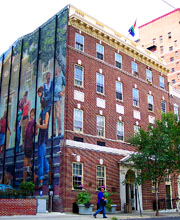What’s In an LGBT Community Center?
Despite the slow economic recovery, 179 lesbian, gay, bisexual and transgender (LGBT) community centers nationwide manage to provide vital resources to 1.7 million people annually. This is according to a new report released this week by CenterLink, a national coalition of LGBT Community Centers, and the Movement Advancement Project (MAP), a national think tank conducting research on behalf of LGBT communities.
Philadelphia’s own William Way LGBT Community Center, which participated in the national survey, is among those community centers that have seen growth – both financially and through its programs – over the past several years. As one of the only LGBT community centers in the United States that privately owns its facility (with approximately 29,000 square feet of usable space), the William Way offers an assortment of activities and support services to the more than 5,000 LGBT individuals and straight-allies who participate in monthly programs.
The William Way is also among the only centers in the country that are open 365 days a year. The center’s also open 68 hours a week and offers among the largest number of service hours among LGBT centers nationally. That’s something to be proud of, Philly.
“We have always done a great job reaching and serving gay men, particular men over the age of 40. However, over the past five years, the center prioritized and successfully engaged other audiences, including LGBT parents and parents of LGBT children, women of all ages, people of color, LGBT young people, and members of the transgender community,” says Christopher Bartlett, William Way’s executive director.
The William Way has also recently partnered on projects and events with GALAEI (the only HIV/AIDS education program in the state of Pennsylvania whose primary mandate is to address the needs of Latino sexual minorities), Elements (comprise of LGBTQ womyn of color who increase visibility, promote holistic healing and address key issues within our communities), and the Philly Dyke March.
“We are grateful to CenterLink and the Movement Advancement Project for conducting annual research that allows us to see our successes and our challenges. With the data collected by MAP, we are able to plot out our future strategically,” says Bartlett.
Click here to view the full report.



